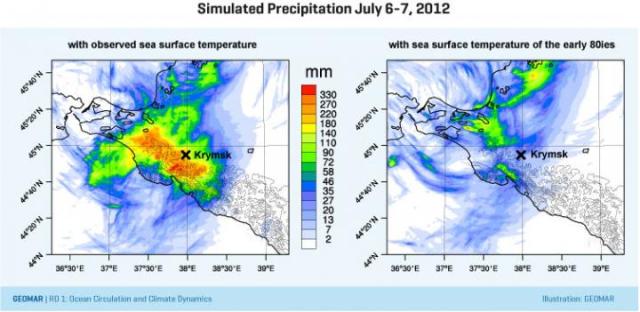Jul 15 2015
That the temperatures on our planet are rising is clear. In particular, the increasing emissions of greenhouse gases such as carbon dioxide continue to warm the atmosphere. The effects of global warming on the hydrological cycle, however, are still not fully understood. Particularly uncertain is how the strength of extreme summertime thunderstorms have changed, and how it may change in the future.
In coastal regions neighboring warm seas, the sea surface temperature can play a crucial role in the intensity of convective storms. The Black Sea and eastern Mediterranean have warmed by about 2 C since the early 1980s. Russian and German scientists investigated what impact this warming may have had on extreme precipitation in the region.
 This image shows simulated precipitation (over 24 hours from 6 to 7 July 2012) of a model run using observed sea surface temperature (a) and (b) using a colder SST representative of the early 1980s). The black cross marks the town of Krymsk, the thin black lines are height contours with a distance of 150 metres. Credit: GEOMAR
This image shows simulated precipitation (over 24 hours from 6 to 7 July 2012) of a model run using observed sea surface temperature (a) and (b) using a colder SST representative of the early 1980s). The black cross marks the town of Krymsk, the thin black lines are height contours with a distance of 150 metres. Credit: GEOMAR
"Our showcase example was a heavy precipitation event from July 2012 that took place in Krymsk (Russia), near the Black Sea coast, resulting in a catastrophic flash food with 172 deaths", said Edmund Meredith, lead author of the study. "We carried out a number of very-high-resolution simulations with an atmospheric model to investigate the impact of rising sea surface temperatures on the formation of intense convective storms, which are often associated with extreme rainfall", Meredith continued. Simulations of the event with observed sea surface temperatures showed an increase in precipitation intensity of over 300%, compared to comparable simulations using sea surface temperatures representative of the early 1980s. "We were able to identify a very distinct change, which demonstrates that convective precipitation responds with a strong, non-linear signal to the temperature forcing", Prof. Douglas Maraun, co-author of the study added.
At the end of June 2015, the nearby Olympic city of Sochi experienced an unusually intense precipitation event. Over 175 mm of rain was recorded in 12 hours, showing the relevance of the scientists work. "Due to ocean warming, the lower atmosphere has become more unstable over the Black Sea and eastern Mediterranean. We therefore expect that events like those in Krymsk or Sochi will become more frequent in the future", added the Kiel-based climate scientist.